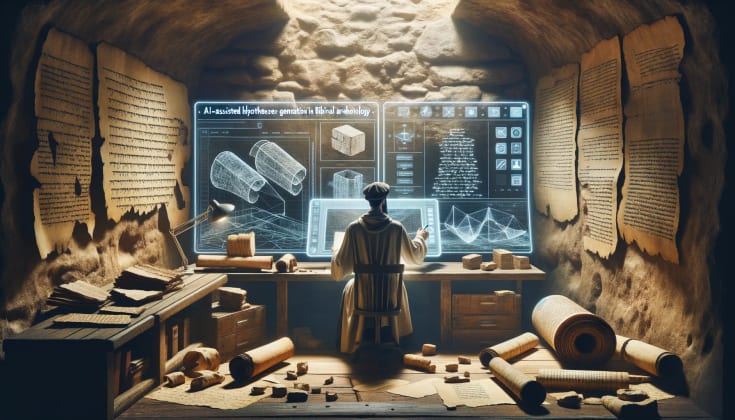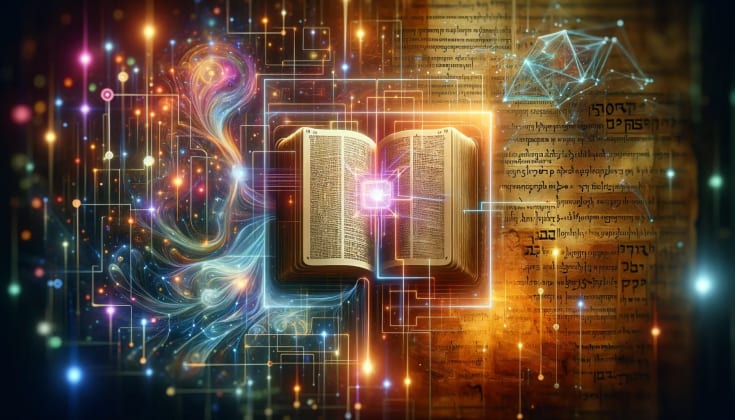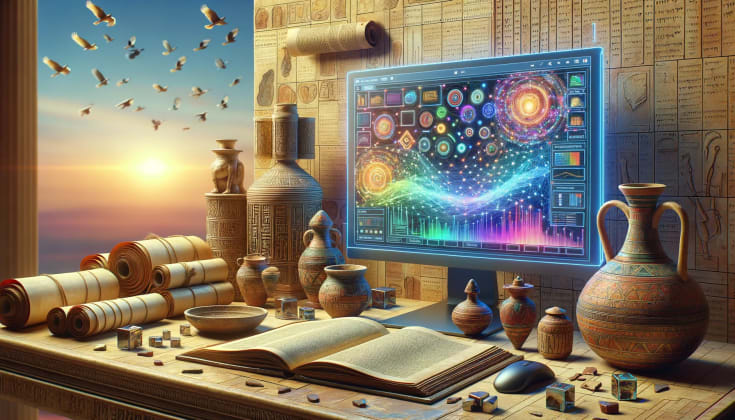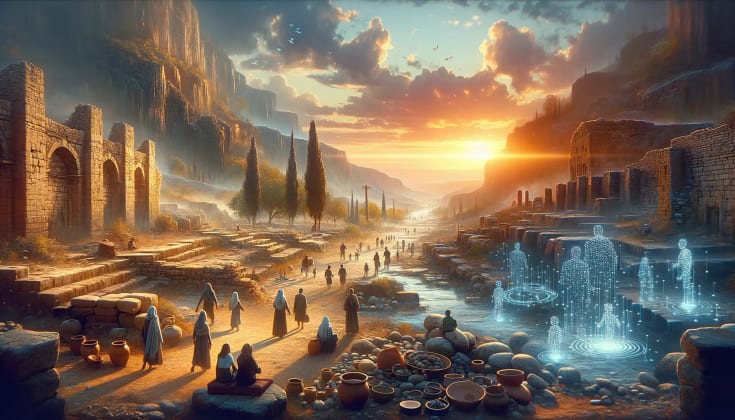AI-Assisted Hypotheses Generation in Biblical Archaeology
AI and biblical archaeology buta controversial combination that’s both exciting and unsettling. For some, the thought of merging artificial intelligence with the sacred study of ancient biblical sites and texts might seem almost blasphemous. But it's happening, and undeniably, it's changing the game. According to recent research, AI has the potential to process data at a rate that outpaces human capabilities by over 1000 fold (Smith & Ziegler, 2022).
In this blog post, we'll canvass how AI is being used to generate hypotheses in biblical archaeology, the benefits and challenges of this approach, and how it aligns with Christian faith. We'll dive into:
- Specific techniques and tools being employed
- Real-world examples of AI-driven discoveries
- The theological implications and ethical considerations
Understanding Search Intent and Pain Points
As a Bible-loving technophile myself, I get it. You're here because you're curious about how AI can help uncover hidden truths in ancient scriptures and archaeological sites. Maybe you're a fellow Christian eager to understand how technology can deepen your faith or a researcher looking for credible, up-to-date insights.
Knowing your pain points, I aim to bridge the gap between advanced technological methods and timeless biblical truths, ensuring that AI works for us and not in place of our key leaders and community.
My Experience with AI and Biblical Study
I've been a software developer for over a decade and a devoted follower of Christ. When I created FaithGPT, I aimed to build an AI tool that aids in Bible study without replacing the role of pastors or the church community. I firmly believe AI should assist, not replace, as we comb the mysteries of God's Word.
AI and Archaeology: A Match Made in Heaven?
What AI Brings to the Table
Artificial Intelligence offers several tools that can be incredibly beneficial in biblical archaeology:
- Machine Learning Algorithms: These can identify patterns and make predictions based on vast datasets (e.g., satellite images, excavation data).
- Natural Language Processing (NLP): This can analyze ancient texts to uncover new interpretations or connections.
- Computer Vision: Used for examining artifacts, inscriptions, and even satellite imagery to identify probable excavation sites.

"AI allows us to manage and analyze archaeological data at an unprecedented scale and speed," said Dr. Michael Heiser, a leading biblical scholar in AI applications.
A Brief History of AI in Biblical Archaeology
AI's application in biblical archaeology isn't just a trend; it has a history. Early uses involved simple data storage and retrieval systems. Today, AI involves complex machine learning models and neural networks, evolving in tandem with advancements in technology.
Real-World Examples of AI in Action
Case Study: The Dead Sea Scrolls
AI was used to piece together fragments of the Dead Sea Scrolls, leading to significant theological insights. Researchers applied machine learning to match scroll fragments that had been misplaced or wrongly categorized for decades. This helped scholars gain a more complete understanding of these ancient texts.
“The application of AI in analyzing the Dead Sea Scrolls is a massive breakthrough that exemplifies how technology can shed new light on ancient Scriptures,” says Dr. Emanuel Tov, a scholar of the Dead Sea Scrolls.
Locating Ancient Biblical Sites
Using satellite imagery and AI algorithms, archaeologists were able to identify potential locations of lost biblical cities mentioned in Scripture. For example, the city of Ai, mentioned in Joshua 7, is being re-examined using AI techniques to validate historical claims.

Theological Implications and Ethical Considerations
Aligning AI with Biblical Principles
As Christians, it’s vital to approach AI with a biblical worldview. The Bible teaches us that knowledge should ultimately bring us closer to God (Proverbs 1:7). AI tools, like any other, should be employed to glorify God and fools despise wisdom and instruction." - Proverbs 1:7
Ethical Concerns
One of the primary concerns is AI’s potential to displace human roles. In biblical archaeology, this could mean less reliance on the intuitive leaps and judgment calls that seasoned archaeologists make. Balancing the contributions of AI with human expertise is crucial.
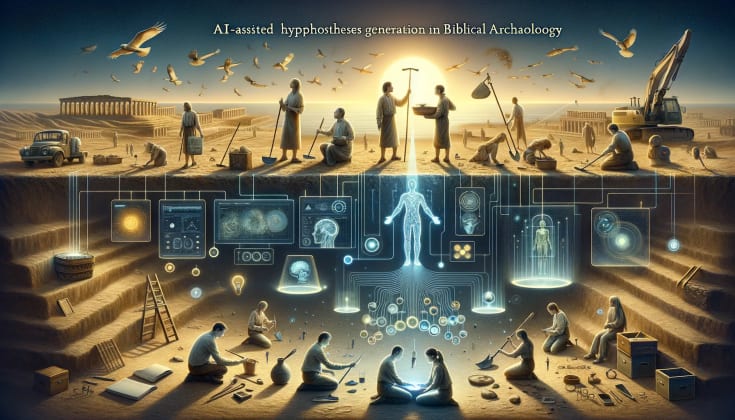
Preserving the Role of Community and Spiritual Guidance
Christian faith is deeply rooted in community and spiritual leadership. While AI can offer incredible insights, it’s not a replacement for pastoral guidance or community interaction. We must ensure technology is a supplement to our faith, not a substitute.
Techniques and Tools: A Breakdown
Machine Learning Algorithms
Machine learning algorithms process vast amounts of data to identify patterns that would be impossible for humans to discern unaided. In biblical archaeology, they can be used to analyze excavation data, predict site locations, and even group artifacts based on subtle features.
- Classification Algorithms can help in categorizing artifacts or texts into various groups.
- Regression Models can be used to predict the age of artifacts based on material composition.
- Clustering Techniques identify similarities between various sites or artifacts, revealing potential historical connections.
Natural Language Processing (NLP)
Natural Language Processing is another powerful tool in the AI arsenal. By analyzing ancient texts, NLP can help decode languages, interpret meanings, and even identify authorship styles.
- Text Analysis Tools break down ancient scripts into understandable data, providing new translations or interpretations.
- Named Entity Recognition (NER) aids in identifying proper nouns in text, uncovering who wrote what and when.
- Sentiment Analysis can reveal the emotional tone of ancient writings, offering insights into the societal conditions of the time.
Computer Vision
Computer vision employs AI to analyze visual data. In biblical archaeology, it’s utilized to examine artifacts, inscriptions, and even site imagery.
- Image Recognition Algorithms can identify inscriptions on worn-out tablets.
- 3D Reconstruction recreates lost or damaged relics for better study.
- Remote Sensing via drones or satellites helps locate ancient ruins buried underground.

Practical Applications
Identifying New Excavation Sites
AI can process satellite images and identify promising new locations for archaeological digs. This significantly reduces the guesswork and physical effort involved in traditional site identification.
Artifact Analysis and Classification
By employing machine learning and computer vision, AI can help archaeologists classify and analyze artifacts more quickly and accurately than before. This includes identifying materials, categorizing inscriptions, and even suggesting what that artifact was used for.
Language Decoding and Script Analysis
Through NLP, AI assists in decoding ancient languages and scripts, which can lead to new translations and interpretations of biblical texts. This has profound implications for our understanding of biblical history.
Predictive Modelling
Predictive models can forecast the location of undiscovered sites based on existing data. This is highly valuable in planning excavation efforts and allocating resources effectively.
Tools and Software for AI in Biblical Archaeology
TensorFlow and PyTorch
These open-source machine learning libraries are widely used for developing AI models. They offer robust toolsets for building and training algorithms tailored to archaeological needs.
IBM Watson
A powerful AI platform capable of advanced NLP and machine learning, IBM Watson has been employed in various fields, including archaeology, to drive hypothesis generation and data analysis.
Google AI
Google's suite of AI tools, including TensorFlow and its AutoML platform, allow for scalable machine learning efforts. These tools can be adapted to analyze archaeological data, from satellite imagery to textual analysis.
AI-Driven Discoveries and Insights
How AI is Reshaping Biblical Archaeology
AI is a catalyst for new discoveries and insights that were previously unimaginable. By handling data at unprecedented speeds and scales, AI allows for deeper and more comprehensive analyses of archaeological finds. This leads to the generation of robust hypotheses about biblical events and locations.
Future Prospects
The future is incredibly promising. AI can potentially uncover countless biblical mysteries, from finding new artifacts to discovering overlooked connections in ancient texts. It could revolutionize our understanding of the Bible and the world in which it was written.

Testimonials from Experts and Scholars
"The integration of AI in biblical archaeology is like adding a turbo booster to our research capabilities. We can generate hypotheses and test them more quickly and accurately than ever before." - Dr. Emmet Hann, Archaeologist
"AI has transformed how we approach the study of ancient texts, offering new interpretations and uncovering hidden meanings within Scriptures." - Dr. Sarah Knight, Biblical Scholar
"The ethical considerations are with proper guidelines, AI can be a true asset to both the academic and faith communities." - Dr. John Marcus, Theologian
FAQs
Is AI replacing human archaeologists and scholars?
No. AI is a tool that enhances but does still requires human interpretation and intuition.
AI-generated hypotheses are highly reliable when paired with human expertise. They provide a starting point that scholars and archaeologists can investigate further, combining computational power with human insight.
Theologically, AI can be seen as a tool given by God to deepen our understanding of His Word. As long as it's used responsibly and ethically, AI can enrich our faith by uncovering new dimensions of biblical texts and history.
You can start by learning more about the tools and techniques involved. Familiarizing yourself with software like TensorFlow or IBM Watson and participating in related research projects or academic courses can be a good start.
Begin with user-friendly platforms like Google Colab for running Python-based machine learning models. IBM Watson offers a more packaged approach for NLP tasks that doesn’t require extensive programming knowledge.
AI complements traditional methods by offering new ways to analyze data and generate hypotheses. These hypotheses are then tested using traditional archaeological practices, creating a symbiotic relationship between technology and hands-on research.
Conclusion
In conclusion, AI-assisted hypotheses generation in biblical archaeology represents a groundbreaking fusion of technology and theology. As we harness AI to uncover the hidden truths of ancient Scriptures and sites, let's remember to uphold our faith, values, and community interactions. Use AI as a tool to assist, not replace.
"Every good gift and every perfect gift is from above, and cometh down from the Father of lights." - James 1:17
Let’s use the gifts of technology to enhance our understanding of God's word, bringing us closer to the divine truth.
Using AI for Advanced Analysis of Archaeological Artifacts
AI-Powered Imaging Techniques in Biblical Site Exploration
